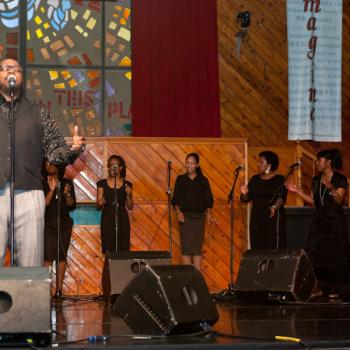Jesus healed, fed, comforted, and thus I believe we are called to do these things as well.
In his speech to a conservative action group earlier this year, Mr. Beck noted that Americans now give more than $300 billion to charities. I applaud this generosity and don't want people to stop giving of their financial resources, but I know from experience that it is relatively easy to take money out of my wallet or write a check; it is much harder to live with charity.
In his recent encyclical (a letter to the faithful and all people of good will), Pope Benedict XVI (a leader no one would describe as anything but conservative) wrote that "Love -- caritas -- is an extraordinary force which leads people to opt for courageous and generous engagement in the field of justice and peace." Justice and peace, people. But the pope went further, to argue that love and reconciliation are at the heart -- or should be -- of all we do and every relationship we hold:
Charity is at the heart of the Church's social doctrine. Every responsibility and every commitment spelt out by that doctrine is derived from charity which, according to the teaching of Jesus, is the synthesis of the entire Law (cf. Mt 22:36-40). It gives real substance to the personal relationship with God and with neighbour; it is the principle not only of micro-relationships (with friends, with family members or within small groups) but also of macro-relationships (social, economic and political ones). For the Church, instructed by the Gospel, charity is everything because, as Saint John teaches (cf. 1 Jn 4:8, 16) and as I recalled in my first Encyclical Letter, "God is love" (Deus Caritas Est): everything has its origin in God's love, everything is shaped by it, everything is directed towards it. Love is God's greatest gift to humanity, it is his promise and our hope.
A World of Hurt
When our lives are shaped by fear, by moral certainty, by anger, by suspicion of those who don't look, live, or believe exactly as we do, we are failing not only the dictates of Christian charity, but of American democracy, and that unfortunately describes the America we are living in now. The politics of division -- and the religion of division -- both turn us against our neighbors, against those in our own families, and certainly against those who are distant and different. We can't see them as people bearing the imprint of God, and we can't treat them as fellow Children of God.
I am starting to think that anything that we allow to divide us is an evil. As I read the Christian Testament, and as James Payton seems to understand it, "Christ's accounting . . . is unmistakable, and it clearly differs considerably from the bookkeeping practiced . . . for far too long" (p. 253). We are not to throw people away over simple disagreements and differences. We are not to divorce ourselves from them over anything less serious than matters of salvation, as Clement said -- or, I would argue in secular terms, less than the survival of our nation.
The problem, of course, is that the dividers on both sides use rhetoric that suggests their opponents are actually destroying the country, that the nation's soul is truly at stake, when the truth is I have met conservatives, moderates, and liberal Americans who love this country and that all of them want it to continue as a force of liberty in the world, and I have met conservative, moderate, and liberal Christians who love God and are seeking to serve God.
And I have met Jews, Muslims, and other people of faith about whom I could say the same thing.
The lessons of the Protestant Reformation and of the American Revolution are not mindless, endless division or random separation. The lessons that are truest to the best and most charitable spirit of those radical moments should be recovery or discovery of those things that truly matter.
We are a nation of immigrants, a nation of many faiths, and if we cannot -- in the immortal words of Lost -- live together, we will most certainly die alone.
On this ninth anniversary of an act of hate, surrounded by recurring acts of hate, I want to propose -- along with Pope Benedict, and the Apostle Paul, and Jesus, and the Beatles, for that matter -- that what really matters is love.
Now let's see where that leads us.
Greg Garrett is the author of works of fiction, criticism, and theology, including the forthcoming The Other Jesus from Westminster John Knox Press. He is Professor of English at Baylor University, and a licensed lay preacher in the Episcopal Church. This article originally appeared at his blog, The Other Jesus.
Read other articles by Greg Garrett at Patheos:





